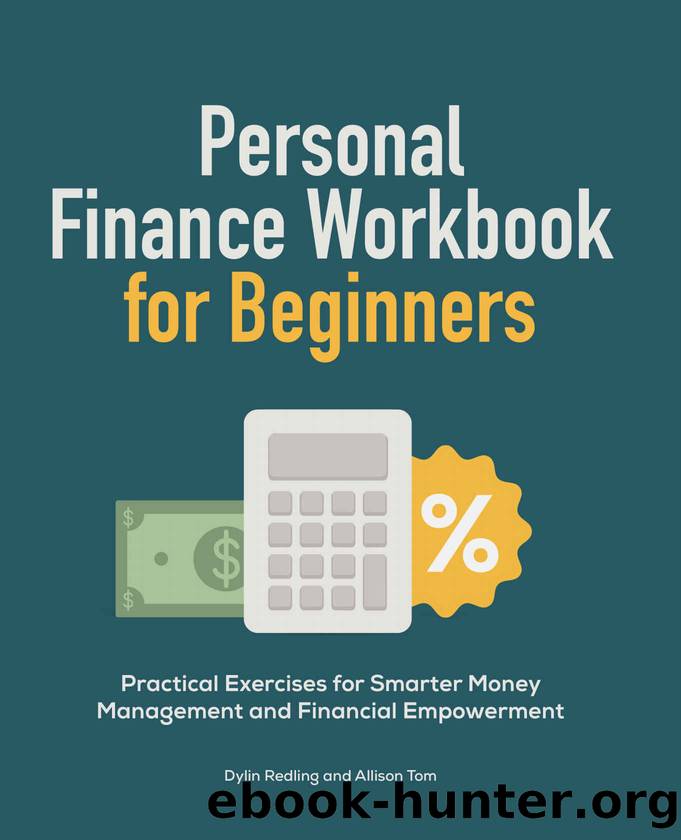Personal Finance Workbook for Beginners by Redling Dylin

Author:Redling, Dylin
Language: eng
Format: epub
Publisher: Rockridge Press
Published: 2022-09-13T00:00:00+00:00
What to Do If You Get Fired or Laid Off
According to studies, 40 percent of Americans have been laid off or terminated from a job at least once in their career. If it happens to you, itâs helpful to know what to do in the moment, what your rights are, and what steps to take.
When you first get the news, try to stay calm, take a deep breath, and assess your situation. The difference between being fired and getting laid off comes down to who is at fault: the company or the employee. An employer may also offer to let you resign, or even try to pressure you into resigning rather than terminating you.
If you get laid off, youâll be in a better position to leave in good standing and explain the circumstances to prospective employers. Collect your final paycheck and ask about severance pay. Although severance is not legally required, many employers will offer it as a gesture of goodwill. A typical package is one to two weeks of paid salary for every year worked.
Find out how long your health insurance is covered and investigate options such as COBRA (the Consolidated Omnibus Budget Reconciliation Act) to ensure you have coverage while youâre unemployed. If youâre leaving in good standing, ask if you can get a reference and assistance finding a new job.
Finally, make sure to file for unemployment benefits. You may qualify even if you were fired, although certain misconduct can disqualify you, such as sexual harassment, safety violations, and drug use. Use the time between jobs wisely by updating your résumé and brushing up on your skills to land an even better job.
Making Sure Your Employment Best Serves Your Financial Health
The tips and strategies in this chapter are designed to help you make the most of your employment and enhance your overall financial health. The earnings from your employment benefit you in many ways, such as helping you pay off your debt, improving your living conditions, and building your retirement savings. The greater your earnings, the lower your debt-to-income ratio, which will enable you to get a better loan or mortgage for your home. And the advantages of your employment run deeper than just your paycheck. In addition to monetary earnings, you may receive benefits to enrich and protect you and your family.
When you examine your employment opportunities, think outside the box, as well. You donât necessarily have to work a traditional 9 to 5 job; there are a number of other types of jobs and avenues to increase earnings. You could work part-time, do freelance or contract work, or take on a side hustle like ride-sharing or renting out a room in your home. Earnings can also come from âpassive income,â such as returns on investments from real estate and stocks, which youâll learn more about in the coming chapters.
Finally, keep an eye on how your job affects your physical and mental health. if your job becomes too stressful, it can take away from the other benefits you earn.
Download
This site does not store any files on its server. We only index and link to content provided by other sites. Please contact the content providers to delete copyright contents if any and email us, we'll remove relevant links or contents immediately.
Harry Potter and the Goblet Of Fire by J.K. Rowling(3036)
Never by Ken Follett(2877)
Shadow of Night by Deborah Harkness(2716)
Ogilvy on Advertising by David Ogilvy(2680)
Zero to IPO: Over $1 Trillion of Actionable Advice from the World's Most Successful Entrepreneurs by Frederic Kerrest(2387)
The Man Who Died Twice by Richard Osman(2293)
Machine Learning at Scale with H2O by Gregory Keys | David Whiting(2278)
Book of Life by Deborah Harkness(2263)
How Proust Can Change Your Life by Alain De Botton(2259)
My Brilliant Friend by Elena Ferrante(2221)
0041152001443424520 .pdf by Unknown(2218)
The Tipping Point by Malcolm Gladwell(2204)
How to Pay Zero Taxes, 2018 by Jeff A. Schnepper(2098)
Will by Will Smith(2039)
Purple Hibiscus by Chimamanda Ngozi Adichie(1980)
Hooked: A Dark, Contemporary Romance (Never After Series) by Emily McIntire(1944)
Borders by unknow(1785)
Rationality by Steven Pinker(1763)
Daughter of Smoke and Bone by Laini Taylor(1742)
